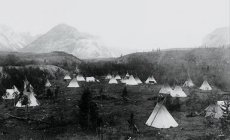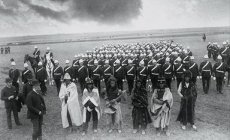Non-market Economies
The isolated,
self-sufficient foraging, pastoralist, and horticultural societies of
the past
rarely had market
economies. Their economies were qualitatively different from
ours in large-scale societies today. In order to understand them, it is
first important to realize that
financial gain was not the prime motivator in the distribution of goods and
services. As a result, standard economic analysis is
inadequate in explaining how and why these non-market economies functioned.
Typically, there is a low level of technological knowledge in societies with non-market economies. There is a preoccupation with the daily and, at most, seasonal food supply because techniques for long term preservation of are generally inadequate. They usually consist only of drying or smoking perishable items. Work teams are small and usually only include members of the local community. Large-scale collaboration on subsistence jobs is of short duration if it occurs at all because most tasks are relatively simple and require only a few people.
|
|
|
|
Non-market economy |
|
|
|
|
|
Market economy North American office worker exchanging his time and work for money |
|
Work related interactions between individuals are of a face-to-face personal kind in non-market economies. People who work together hunting, gathering, herding, or tending crops are usually kinsmen or lifelong friends and neighbors. Little or no attempt is made to calculate the contribution of individuals or to calculate individual shares of what is produced. Social pressure generally obligates individuals to freely share food and other products of their labor with whomever needs it or asks for it in the community. This operates as an economic leveling mechanism. As a result, there is little or no possibility of saving and becoming more wealthy than anyone else. Subsequently, the incentive to work is not only derived from a desire to acquire what is being produced but also from the pleasure of working with friends and relatives. In addition there is potential for increased social prestige from doing the job well. This is radically different from a factory or office job in a modern market economy. In that kind of work, strangers come together, often in impersonal groups of thousands. Every minute of labor is accounted for because pay varies with the specific job an individual does and how much time is spent in doing it. The goal of work is likely to be primarily the money that is paid for doing it rather than the pride in producing a good product or working with friends. However, there is a greater opportunity to save and accumulate wealth in market economies.
There rarely are impersonal commercial exchanges
in non-market economies. The distribution of goods and services usually
occurs through either barter or gifts and involves a considerable amount of social interaction.
Barter
![]() is trading goods and services directly for other
goods and services without the use of money as a medium of exchange. For
instance, if I have a fish and want the bunch of bananas that you have,
I might negotiate a trade with you. However, if you do not want my fish,
I will need to barter with someone else who has something for which you would be
willing to trade. This can be a complicated, time consuming process
involving a good deal of talking.
is trading goods and services directly for other
goods and services without the use of money as a medium of exchange. For
instance, if I have a fish and want the bunch of bananas that you have,
I might negotiate a trade with you. However, if you do not want my fish,
I will need to barter with someone else who has something for which you would be
willing to trade. This can be a complicated, time consuming process
involving a good deal of talking.
In small-scale societies,
barter is generally used in exchanges with people from other friendly
communities. When the communities are frightened of or hostile towards
each other but still wish to trade, dumb-barter
![]() may occur. This is barter without direct contact
between the traders. Individuals from one group leave trade goods at a
neutral location usually on the edge of their territory and then leave. Sometime
later, members of the other community pick up the goods and leave something in
exchange. The first group then returns and either picks up the things
that were left by the strangers or leaves them until additions or
substitutions are made that are acceptable. In the past, dumb-barter of this sort
occurred in parts of West Africa, Northern Scandinavia, India, Sri Lanka, Sumatra,
Timor, New Guinea, and the Amazon Basin of South America. Dumb-barter
is also known as silent trade and depot trade.
may occur. This is barter without direct contact
between the traders. Individuals from one group leave trade goods at a
neutral location usually on the edge of their territory and then leave. Sometime
later, members of the other community pick up the goods and leave something in
exchange. The first group then returns and either picks up the things
that were left by the strangers or leaves them until additions or
substitutions are made that are acceptable. In the past, dumb-barter of this sort
occurred in parts of West Africa, Northern Scandinavia, India, Sri Lanka, Sumatra,
Timor, New Guinea, and the Amazon Basin of South America. Dumb-barter
is also known as silent trade and depot trade.
Gift giving is a common form of non-market exchange within a community. In small-scale societies, the gifts are frequently tools, food, and other supplies needed to meet family shortages. Public opinion forces a family whose harvest is larger than another's to share it. This results in equality of distribution within the community. The primary motivation for this form of economic exchange is not economic but social. Political power and influence in small-scale societies with non-market economies rarely comes from the control of production and wealth. Rather, it comes from social status, and that is usually acquired by gaining respect through generosity and personal skills such as being a good story teller, curer, hunter, or midwife. Often the most influential person is the one who has impoverished himself by giving away virtually everything of value to others.
|
Principal
form of exchange |
|
| Within a society | gift giving |
| Between friendly societies |
face to face barter |
| Between mutually hostile societies | dumb barter (rare) |
Social ties function as rudimentary credit institutions in non-market economies. Kinship bonds within and between families operate to facilitate the distribution of food and other goods through the community. This distribution most often takes the form of gifts. Giving gifts is perceived as a strong moral obligation between kinsmen. Since these small-scale societies usually consist of people who are all related to each other through actual or fictive kinship, everyone is protected by this economic security net.
The crucial difference between gifts and sales is that gift exchanges create and strengthen social relationships. In contrast, continuing social relations are generally incidental when things are bought and sold in a market economy. In order to better understand this, think about the difference between a birthday gift and a supermarket purchase. When you give a friend a birthday present, it reinforces the bond between you and sets up an obligation for your friend to reciprocate when it is your birthday. If you purchase an item at a supermarket, there rarely is a bond created between you and the people working there. There is not an inherent social component to this type of exchange, especially in cities.
Formal market places are rare in isolated, small-scale societies because the advantages of trading in them are slight. Every household usually provides for its daily needs from its own production. Surpluses cannot be easily sent to areas of scarcity because of the difficulties of transport. Serviceable roads and vehicles to carry surplus goods to market are scarce or non-existent. Adequate food preservation technology is usually not available either, so perishable things do not last long. When formal markets do exist in isolated, small-scale societies, they are more likely to be places where non-perishable luxury items are traded (e.g., beautiful feathers and mollusk shells used to make jewelry and other ornaments).
Non-market economies can only function successfully in isolation. They have always been destroyed by prolonged contact with societies that have market economies.
Concepts of Ownership
In societies with non-market economies, land and
other property rights are usually restricted by the overriding rights vested
in the community as a whole. Ownership is based on the concept of
usufruct
![]() .
This is very different from the concept of proprietary deed
.
This is very different from the concept of proprietary deed
![]() that is common in large-scale market economies. With usufruct, an owner
normally can "own" land and other substantial property only as long as it is
being used or actively possessed. The society as a whole is the real
owner. The individual "owner" is responsible for looking after the
property for the society--he or she essentially only has stewardship over it.
If the "owner" no longer needs the property or dies, it is reallocated by the
society to others. In contrast, with proprietary deed, an owner of
property has the right to keep it whether or not it is being used or actively
possessed. For instance, an individual may own a number of houses and
never use them. In addition, the owner has the right to pass the property on to descendants or to
others chosen by the owner. In fact, ownership is not always absolute in
large-scale societies today. In the United States, for instance,
ownership may be forfeited to the government under certain circumstances
(e.g., eminent domain
that is common in large-scale market economies. With usufruct, an owner
normally can "own" land and other substantial property only as long as it is
being used or actively possessed. The society as a whole is the real
owner. The individual "owner" is responsible for looking after the
property for the society--he or she essentially only has stewardship over it.
If the "owner" no longer needs the property or dies, it is reallocated by the
society to others. In contrast, with proprietary deed, an owner of
property has the right to keep it whether or not it is being used or actively
possessed. For instance, an individual may own a number of houses and
never use them. In addition, the owner has the right to pass the property on to descendants or to
others chosen by the owner. In fact, ownership is not always absolute in
large-scale societies today. In the United States, for instance,
ownership may be forfeited to the government under certain circumstances
(e.g., eminent domain
![]() , failure to pay taxes, or
its use in the commission of a
felony).
, failure to pay taxes, or
its use in the commission of a
felony).
When European Americans encountered indigenous foraging peoples with non-market economies in North America during the 18th and 19th centuries, there were conflicts that arose as a result of the failure of both societies to understand the other's concept of ownership. Most often, the indigenous societies had usufruct concepts, while the U.S. legal systems was solidly based on proprietary deed. When government representatives or individuals bought land from Indians, they assumed that they were acquiring all of the proprietary rights to the property. At the same time, the Indians often thought that they were only selling or leasing the use of the property. When the Indians did not leave the land or returned to it later to live, they were perceived as reneging on a legal contract. From their perspective, the European Americans were taking something that did not and could not belong to them. More often than not, the result was hostile relations. The same kind of cultural misunderstanding occurred in western Canada as well. During the 19th century, there was a common derogatory term in the U.S. that owes its origin to the European American misinterpretation of this sort of failed agreement. Anyone who wanted property back despite the fact that there was a binding agreement to sell or trade it was referred to as an "Indian giver."
 |
 |
|
| 19th century
Canadian Indian camp set up on the principle of usufruct |
19th century treaty
signing ceremony |
The concept of usufruct was not unique to Native American societies. It has been an important cultural pattern in many small-scale societies around the world, especially among pedestrian foragers.
This page was last updated on
Friday, March 16, 2007.
Copyright 2003-2006 by Dennis
O'Neil.
All rights reserved.
Illustration credits

